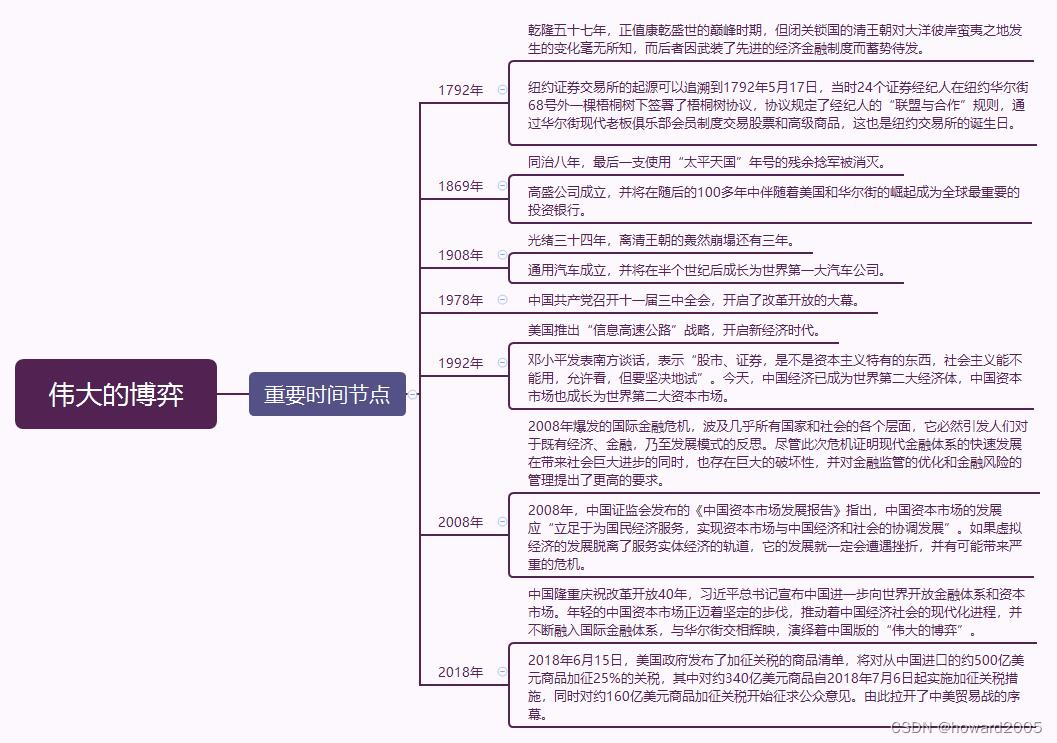History of the Great Game
Posted howard2005
tags:
篇首语:本文由小常识网(cha138.com)小编为大家整理,主要介绍了History of the Great Game相关的知识,希望对你有一定的参考价值。
文章目录
1. History of the Great Game
(1) Stock Market - The Great Game
For centuries, the stock market has been the game of choice for people interested in investing their money in risky but possibly profitable ventures. The stock market is often described as “the great game” since it takes a combination of skill and luck to strike gold in this dynamic and highly competitive world.
(2) Courratiers De Change - France
The origin of this great game can be traced back to 12th century France, where so called courratiers de change (外汇经纪人) made a living managing the debts of agricultural communities on behalf of banks. These courratiers de change could buy and sell debts and was thus an early form of financial market brokers (金融市场经纪人).
(3) Government Securities - Venice
During the 14th century, bankers in Venice began trading in government securities (公债). The trade became so significant that the Venetian government was compelled to issue a law in 1351 forbidding the spreading of rumors intended to lower the price of government funds. From Venice, the great game of dealing in government securities spread to the nearby city states Pisa, Genoa, Florence and Verona. What these five city states had in common was that they were independent, i.e. not ruled by duke but by a council of citizens.
(4) The Center of Financial Innovation - Amsterdam
Considering the abovementioned piece of Italian financial history, it is not surprising that Italian companies were the first to began issuing shares. Companies in England and the Low Countries (低地国家:荷兰、比利时和卢森堡) followed in suit, and the Dutch East India Company (荷兰东印度公司) (founded in 1602) became historical by being the first joint-stock company to establish a fixed capital stock. Continous trade in company stock emerged as a result – the great game of stock trading had truly started.
Now, the center of financial innovation was no longer Italian city states but Amsterdam (阿姆斯特丹), the thriving capital of the Low Countries. It was here that trade in derivatives (衍生品), options (期权) and repos (回购) was firmly established, adding new fascinating aspects to the great game. As early as 1610 the government decided to ban a new invention that remains as controversial today as it was back then – short selling (卖空).
Today, people all over the world engage in the tantalizing game of stock market trading and even those that don’t are affected by the events of the equity market (产权交易市场). Modern wannabe traders can trade from their computers and use practice accounts to learn how to trade with stocks, binary options (二元期权) and other financial instruments.
(5) The Heart of Stock Trading - New York
Amsterdam is no longer the heart of stock trading; it is instead in New York (纽约) – a city known as New Amsterdam (新阿姆斯特丹) from 1625 to 1673.
The largest stock market in the world, measured by average daily trading volume (日均交易量) and overall market capitalization (总市值), is the New York Stock Exchange, NYSE. New York is also home NASDAQ, the world’s second largest stock market.
2. NYSE (New York Stock Exchange)
(1) What Is NYSE
For many, the New York Stock Exchange (NYSE) is more or less synonymous with the great game that is stock trading. Located on the iconic Wall Street in Lower Manhattan, NYSE averaged a daily trading value slightly above 153 billion U.S. dollar in 2008. The NYSE trading floor is located at 11 Wall Street and consists of four trading rooms where the game of trading takes place. Since NYSE’s merger with the electronic stock exchange Euronext in 2007, the exchange is operated by NYSE Euronext (纽约-泛欧交易所集团).
(2) NYSE Composite Index
In 1966 the NYSE Composite Index (纽约股票交易所综合指数) was created and given a value of 50 points, based on the market closing (收盘) on December 31, 1965. Unlike the Dow Jones Industrial Average (道琼斯工业平均指数), founded by Charles Dow in 1896, the NYSE Composite Index reflects the value of a very large number of stocks traded on NYSE. (The Dow Jones started out with 12 stocks from leading U.S. industries and was increased to 30 stocks in 1928.) The NYSE Composite Index covers over 2,000 common stocks listed on NYSE, including roughly 360 companies that are not based in the United States. Of the 100 included companies with the largest market capitalization, 55 are not based in the U.S. In 2003, the NYSE Composite Index set a new base value of 5,000 points based on the market closing on December 31, 2002.
(3)NYSE’s Opening Hours
In the New York Stock Exchange, the great game of trading takes place Monday to Friday from 09:30 to 16:00 EST.
3. NASDAQ
(1) What Is NASDAQ
The NASDAQ Stock Market (纳斯达克股票市场:美国第二大股票交易所), also known simply as NASDAQ, has nearly 2,900 listed companies and more trading volume than any other electronic stock exchange in the world. Since 1998, NASDAQ is headquartered in New York. Before the relocation it was based in Washington D.C.
The acronym NASDAQ originally stood for National Association of Securities Dealers Automated Quotations (全美证券商协会自动报价系统), but that is no longer the formal name. NASDAQ uses a screen-based system for trading and is operated by the NASDAQ OMX Group.
(2) NASDAQ’s Four Indices
NASDAQ has four indices:
- NASDAQ-100
- NASDAQ Biotechnology Index
- NASDAQ Composite
- NASDAQ Bank
(3) NASDAQ’s Opening Hours
If you wish to use NASDAQ to participate in the stock trading game, these are the opening hours:
- Pre-market session 07:00-09:30 EST
- Normal trading session 09:30-16:00 EST
- Post-market session 16:00-20:00 EST
(4) Nasdaq OMX Nordic
NASDAQ OMX Nordic (纳斯达克北欧交易所) cover markets for Helsinki, Copenhagen, Iceland, Tallinn, Riga, Vilnius and Stockholm. For more info on these nordic markets, visit nasdaqomx.com or read more about nordic economy on sverigekredit.se.

以上是关于History of the Great Game的主要内容,如果未能解决你的问题,请参考以下文章
UVA - 1045 The Great Wall Game(二分图最佳完美匹配)
ACM-ICPC 2018 南京赛区网络预赛 K. The Great Nim Game
The Geologic History of the Mediterranean